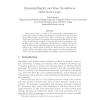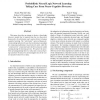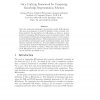225 search results - page 8 / 45 » Knowledge Representation and Possible Worlds for Neural Netw... |
KBS
2011
13 years 2 months ago
2011
Order-sorted logic is a useful tool for knowledge representation and reasoning because it enables representation of sorted terms and formulas along with partially ordered sorts (c...
ICTAI
2009
IEEE
14 years 2 months ago
2009
IEEE
This paper describes an attempt to devise a knowledge discovery model that is inspired from the two theoretical frameworks of selectionism and constructivism in human cognitive le...
ISNN
2007
Springer
14 years 1 months ago
2007
Springer
In the human mind, high-order knowledge is categorically organized, yet the nature of its internal representation system is not well understood. While it has been traditionally con...
KRDB
2003
13 years 8 months ago
2003
Given the numerous knowledge representation models (KR-schemes) that have been proposed, it would be desirable to have a formal, unifying model for the description of a KR-scheme,...
GECCO
2008
Springer
13 years 8 months ago
2008
Springer
For artificial entities to achieve high degrees of autonomy they will need to display appropriate adaptability. In this sense adaptability includes representational flexibility gu...



